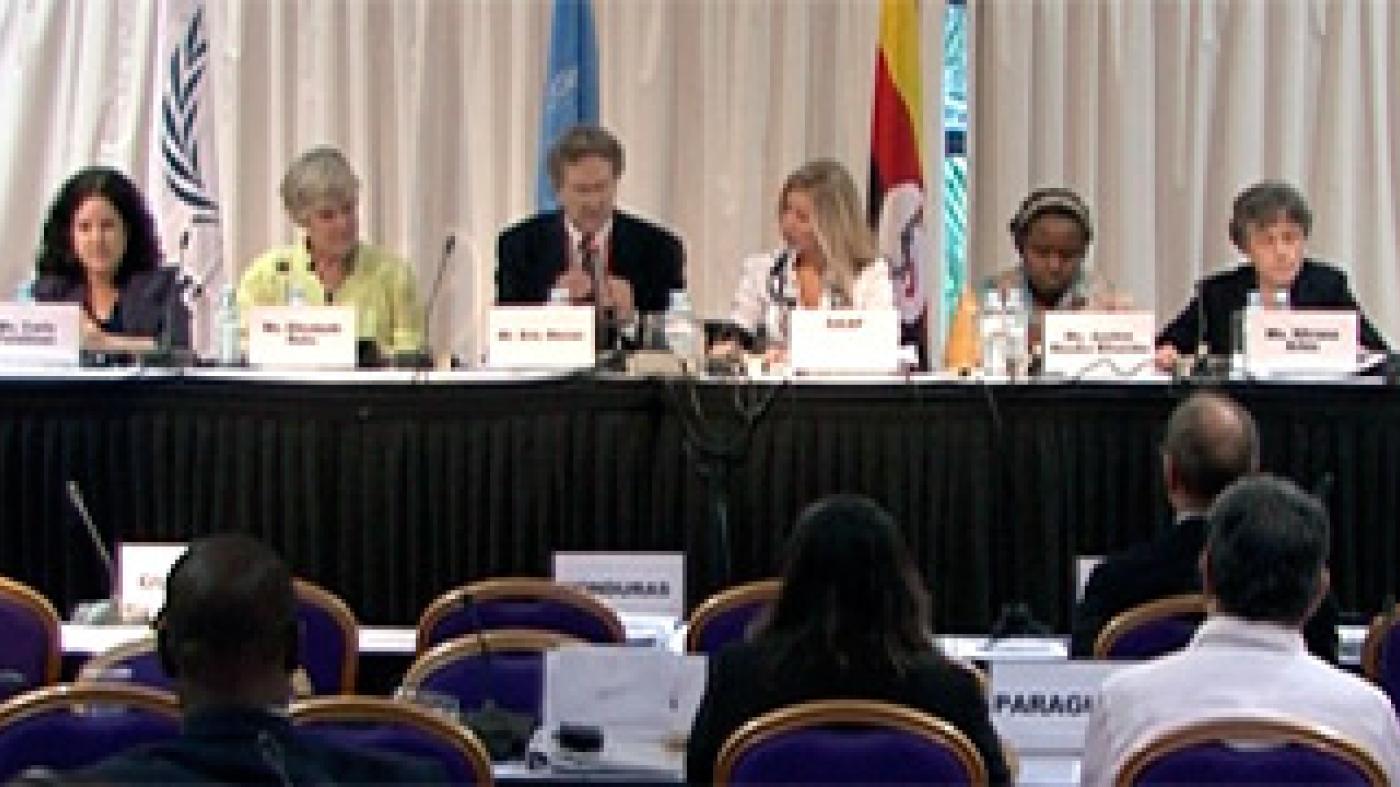
The Registrar of the International Criminal Court (ICC), Madame Silvana Arbia, participated today in a panel discussion on the impact of the work of the Court on victims and affected communities. Discussions focused on participation of victims, protection of victims and witnesses, the role of outreach and the Trust Fund for Victims.
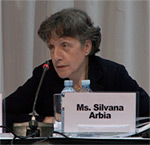 |
| Silvana Arbia, The Registrar of the ICC ©ICC-CPI |
The event was organised by the Assembly of States Parties to the Rome Statute as part of its stocktaking exercise during the Review Conference of the Rome Statute, held in Kampala, Uganda.
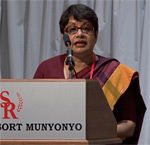 |
| Radhika Coomaraswamy, Special Representative of the United Nations Secretary-General for Children and Armed Conflict ©ICC-CPI |
The discussion was opened with a presentation by Ms Radhika Coomaraswamy, Special Representative of the United Nations Secretary-General for Children and Armed Conflict, followed by the screening of a video honouring victims of atrocities committed during conflicts.
Besides Ms Arbia, speakers also included Ms Binta Mansaray, Registrar of the Special Court for Sierra Leone and former chief of its Outreach Section; Carla Ferstman, Executive Director of the NGO Redress; Ms Elisabeth Rehn, President of the Board of Directors of the Trust Fund for Victims of the ICC; Ms Justine Masika Bihanba of the NGO Synergie des femmes pour les victimes de violence sexuelle in the Democratic Republic of the Congo; David Tolbert, President of the International Center for Transitional Justice and former Deputy Prosecutor of the International Criminal Tribunal for the Former Yugoslavia. The discussions were moderated by Mr Eric Stover, Director of the University of California, Berkeley Human Rights Center.
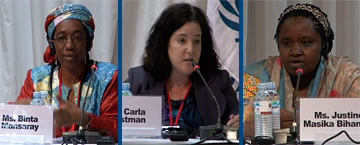 |
| From left to right: Binta Mansaray, Registrar of the Special Court for Sierra Leone, Carla Ferstman, Executive Director of the NGO Redress and Justine Masika Bihanba of the NGO Synergie des femmes pour les victimes de violence sexuelle in the Democratic Republic of the Congo ©ICC-CPI |
The ICC Registrar explained that the Rome Statute was a landmark in furthering victims’ rights by codifying their right to participation. She indicated that in many systems, the only role for victims in criminal proceedings is as witnesses. However, the ICC system enables victims to participate in proceedings. This means that they can give their views and express their concerns directly to the judges where their interests are affected. It is crucial that the process of enabling victims to make their applications for participation is done in the place where victims are located, and in a safe and secure environment so as not to put them at risk.
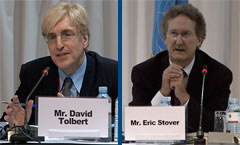 |
| From left to right: David Tolbert, President of the International Center for Transitional Justice and Eric Stover, Director of the University of California, Berkeley Human Rights Center ©ICC-CPI |
To date 2,648 victims have applied; 770 have been authorised to participate in the proceedings. Ms Arbia indicated that the experience made victims feel that their suffering is acknowledged. “It is a way by which they honour those relatives, friends and community members lost or injured in the atrocities under investigation. Furthermore, they feel that they are best placed to explain the historical and cultural background to the events and, in this sense, they feel they can contribute to the establishment of the truth”, she said.
With regard to protection of victims and witnesses, Ms Arbia stressed that the Court has developed sustainable protective measures, beginning with local protection measures. This can entail strengthening the physical security of the residence of witnesses and victims as well as use of Initial Response System; this is a 24/7 emergency response system that enables the Court to be informed at short notice of any immediate threat to victims and witnesses in order to take appropriate action, including relocating the person, if necessary.
The ICC Outreach was presented as a third generation programme following the work done in this field by the International Criminal Tribunal for the Former Yugoslavia and the Special Court for Sierra Leone. The Registrar explained that outreach is a two-way communication between the Court and communities affected by situations currently before the Court. The Programme was established to make judicial proceedings accessible to communities, including victims, in countries where the Court operates. The importance of a robust outreach programme and the need to act where the victims live was underlined by several speakers.
Finally, participants praised the work done by the co-facilitators who had organised the Panel, Chile and Finland, and in particular Ms Elena Bornand and Ms Miia Aró-Sánchez.
Video summaries of the panel are available on the ICC Youtube Channel: part 1 – part 2 .
For further information please contact Ms Sonia Robla, Chief of Public Information and Documentation Section at +31 (0)70 515-8089 or +31 (0) 6 46 44 87 26 or at [email protected].